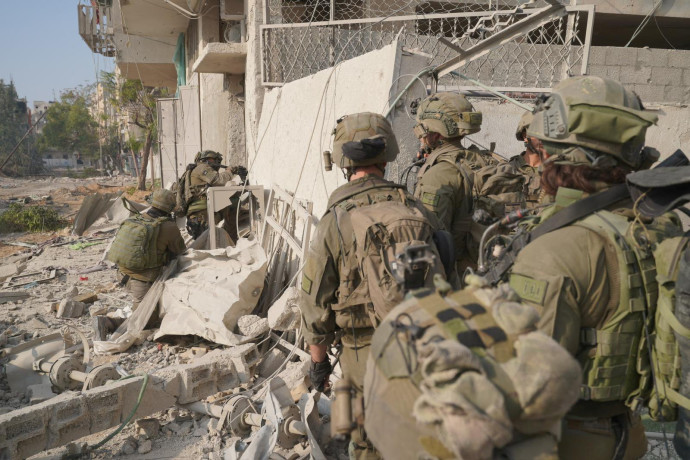In the immediate aftermath of the October 7 Hamas massacre, some 360,000 reservists received emergency call-up notices and showed up for duty.
The wife of one of those reservists recalls that her five-year-old son cried when he learned that his father would be going into the army. The boy was worried that his father wouldn’t be home to celebrate his birthday.
“What are you worried about?” she reassured him. “Your birthday is not until Hanukkah. Of course, he’ll be home by then.”
He wasn’t.
Everyone thought Israel-Hamas war would end sooner rather than later
But that exchange reflects what many people thought on October 7: That within a matter of weeks, the war would be over.
And there was good reason to believe that. Except for the War of Independence and the First Lebanon War, most of Israel’s wars have been relatively short: 100 hours during the 1956 Sinai Campaign, Six Days of war in 1967, 19 days of the Yom Kippur War in 1973, and 34 days of the 2006 Second Lebanon War.

Even though the type of fighting in Gaza is significantly different from what Israel faced in any of its previous wars – combat in densely populated urban areas and subterranean warfare – Israel has had some experience there as well, having fought several significant rounds in Gaza since the withdrawal in 2005. But even those were of relatively short duration: Operation Cast Lead lasted 23 days in 2008-2009, and Operation Protective Shield lasted 49 in 2014.
On Sunday, Israel marked three months from the beginning of the war with Hamas. Three months during which more than 100 hostages remain in Hamas captivity, during which 360,000 reservists are away from family and work, during which Israel is fighting – with various degrees of intensity – on six fronts (Gaza, Judea and Samaria, Lebanon, Syria, Iraq, and Yemen).
Few thought that it would take this long or that Israel would be on full war footing three months later.
That it has taken this long with no clear end in sight, however, is not a sign of failure. Far from it. Instead, it is a sign of trying to defeat a well-entrenched ruthless enemy – one indifferent to the plight and well-being of their own people – while trying to spare the lives of the kidnapped hostages and IDF soldiers, minimize civilian casualties on the other side, and retain international legitimacy. That is all a formidable challenge.
Israel’s leaders, both political and military, have said from the outset that this will not be a lightning war, but slow, and that patience is needed.
This, at least, is one expectation that has been met. Nevertheless, a lot has changed in the ensuing three months, both regarding the war and in terms of Israeli society in general. Here are just a few of those changes.
What are the expectations from Israel's war on Hamas?
In the pain, fury, and rage that followed the October 7 atrocities, Prime Minister Benjamin Netanyahu, as well as the heads of the military, spoke in terms of destroying Hamas and toppling it from power.
Three months on, that objective has changed. Now fewer are talking of destroying Hamas completely – recognizing that an ideology cannot be destroyed.
Instead, today there is more talk of radically downgrading and degrading Hamas’s capabilities so that after the war, even if Hamas’s genocidal ideology still survives, they will not have the capacity to pursue it. Israel is proceeding nicely in pursuit of this goal, having killed some 8,000 Hamas terrorists in northern Gaza alone since the fighting began and destroyed tens of thousands of Hamas targets.
The world's opinion on Israel
All one has to do is open up one of the world’s elite newspapers, tune into BBC or CNN, or scan X to see that in this war – despite the brutal and unprovoked attack on Israel – the Jewish State is not exactly the world’s darlings.
That being said, few would have imagined that Israel would have been able to continue its war in Gaza at a very high level of intensity for three months without the world stepping in and imposing a ceasefire.
The savagery of the Hamas attacks, coupled with an understanding at least at the governmental level in countries like the US, Germany, and Britain, of what Hamas is after and what it would mean for the region if it is not roundly defeated, has given Israel the time it needs to methodically dismantle Hamas’s military capabilities inside Gaza.
When the war began, there was much talk about how the diplomatic clock was ticking, and Israel had just a limited amount of time to achieve its goals. Three months down the line, it appears Israel has had more time than many had imagined.
October 7 and this war have already changed Israeli politics. To many, the formation of a unity government during wartime is something that should be obvious and a given – but it isn’t. Considering the political enmity that existed over proposed judicial reform and the character of the government between the coalition and opposition before October 7, it is no small feat that a unity government of some sort emerged at all.
Considering the hostility that Netanyahu and men like Benny Gantz and Gideon Sa’ar have for one another, it should not be taken for granted that they are willing to sit together around the cabinet table even during wartime. That Yair Lapid and Avigdor Liberman were unwilling to do so just proves the point.
But that National Unity’s Gantz and Sa’ar entered the government soon after October 7 – and have stayed in it despite differences of opinion both about how the war is being waged now and what Gaza should look like in the future – shows that it is not politics as usual. After October 7, the public very much wanted to see a unity government, and Gantz heeded the call.
Since then, Gantz’s party has soared in the polls, and both Likud and Yesh Atid have dropped precipitously, with Avigdor Liberman’s Yisrael Beytenu increasing in strength largely because of his very hawkish view. The political map has already changed, and is likely to change even more dramatically before the next elections – whenever those may be.
Israel's priorities
The relatively muted reaction to last week’s twin High Court of Justice rulings – one striking down an amendment to a Basic Law repealing the reasonableness statute and the other postponing legislation regarding who can recuse a sitting prime minister – shows that Hamas has fundamentally upended this country’s priorities.
Had these decisions been handed down before the Hamas attack, the country would have witnessed a huge uproar, with pro-judicial reform advocates taking to the streets to protest the “dictatorship of the courts,” and anti-judicial overhaul activists holding rallies extolling the saving of democracy. But now, except for some groans from the usual suspects, the rulings did not make much of a public impact.
Why? Don’t people care anymore about the judiciary Israel’s democracy or the balance of powers? No, they care, but on Maslow’s hierarchy of needs, this now takes a backseat. It is important, but right now there are much more pressing – even existential – matters at hand.

Israel's security doctrine
For the last 15 years, the predominant security doctrine has been a passive one based on deterrence, the idea being that Israel could live with ideologies on its borders preaching Israel’s destruction out of a belief that these organizations would never act on their ideology, knowing full well that if they did, they would incur the substantial wrath of the Israeli army.
Hamas proved this assumption false, showing on October 7 that it was in no way deterred by Israel’s overwhelming power. This has led to a change in Israel’s doctrine.
If Israel before October 7 was willing to live with a situation where bloodthirsty terrorist organizations with significant military capabilities lived within spitting distance of its civilian communities – and Israel paid a horrible price for allowing that to happen in the South – it is no longer willing to tolerate this.
This is clear in Israel’s policy now toward Hezbollah and Jerusalem’s demand that it be moved a safe distance from Israel’s border. This can be accomplished through diplomacy (preferably), but – if necessary – by military action. That demand is a new one reflecting a major change in how October 7 and the ensuing three months of war have already changed the country in significant ways.
